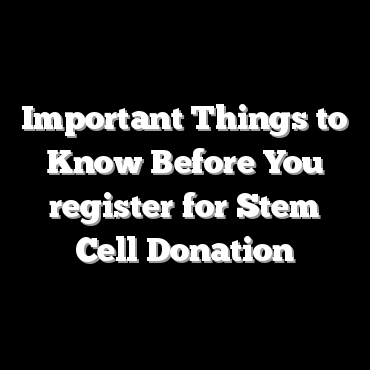For patients of blood cancer or blood disorder, a stranger donating stem cells uplifts their survival chances. People typically volunteer for donating stem cells for an allogeneic transplants either because they’ve got a friend or a loved one who is in need of a match or because they’re willing to help people. Some people donate stem cells so they’re able to later get them back if they require an autologous transplant.
What to expect while donating stem cells for strangers?
Medical guidelines have been in place for the protection of potential donor health, along with bone marrow health and patients of stem cell transplantation. There are various factors that can affect someone’s eligibility to register for stem cell donation.
People, including the cancer survivors, who’re willing to join volunteer registry or make stem cell donation can look for their eligibility on the registry. Also they can contract National Marrow Donor Program or get in touch with a health care expert for finding nearest donation center.
Potential donors will be asked some questions for ensuring whether they’re healthy for donating and whether they don’t pose infection risk to recipient. To get more donor eligibility information, and guidelines, for being the match you can look out for the area’s donor center.
A simple blood test takes place for learning about HLA type of the potential donor. You can be charged one-time, tax-deductible fee of around $75 – $100 for the blood test. People joining the volunteer donor registry most likely have got their tissue type kept on file until they’re of age 60.
Prior to Donation: Consent along with further testing
When the possible stem cell donor comes as a good recipient match, some measures are taken for teaching donor about process of transplantation and for ensuring whether the donor is going for a sound decision.
When someone wants to donate stem cells, a consent form should be signed after donating risks get discussed fully. The donor isn’t pressured for taking part. As this is always left to choice!
When someone decides about donating, the blood tests and medical exam gets done for ensuring that the donor is in great health.
How the stem cells are collected
After you register for stem cell donation, stem cells are collected with 3 different procedures:
- Bone Marrow: Also known as bone marrow harvest, here the marrow cells are collected from pelvic bone. Donor lies with face down with large needle through skin into back of hip bone. It is pursed through bone to center and thick, liquid marrow gets pulled through needle. It gets repeated various times until enough marrow is harvested.
- Peripheral Stem Cells: Prior to donation process for stem cells, donor is provided with daily shot of drug causing the bone marrow to create stem cells inside blood. After these shots, the blood gets taken out with a medicine separating stem cells from other blood cells.
- Collection of Umbilical cord blood: Cord blood is left in the placenta and umbilical cord after the baby gets born. The collection doesn’t pose health risk for mother or the infant. Cord blood also transplants use of blood that can otherwise get thrown. After the umbilical cord gets cut and clamped, the umbilical cord and placenta are cleaned. Cord blood gets put into a sterile container with mixed preservatives and is frozen until required.
All know side effects along with risks for donation are explained in a detailed information session completed through a registered nurse, along with the physician who oversees donation. When you’re selected for the match for the patient and proceed with a donation, it is vital to have a list of questions that you’ve got. This is to ensure that you become comfortable with answers after meeting with different professionals of health care.
Gift of Life Marrow Registry Also Offers Following Services :
Contact US:
Gift of Life Marrow Registry Address: 800 Yamato Rd suite 101 Boca Raton, FL Phone: (800) 962-7769
